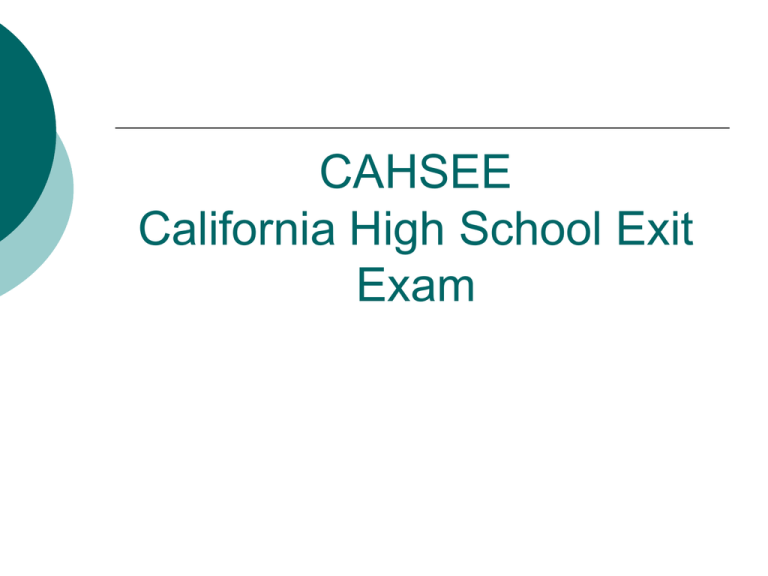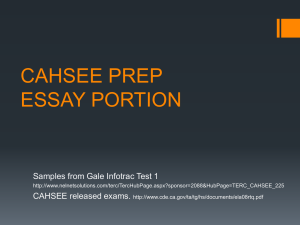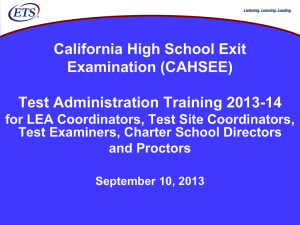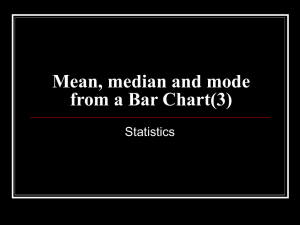CAHSEE Powerpoint_1__ppt 2
advertisement

CAHSEE California High School Exit Exam OVERVIEW Purpose of the CAHSEE Background Contents of the CAHSEE School Accountability Lawsuits against the CAHSEE and 2006 disability waiver Options for students who do not pass the CAHSEE CAHSEE Survey distributed to faculty at South El Monte High School Demographics of SEMHS Survey results Pros and Cons of the CAHSEE Recommendations regarding the future of the CAHSEE Background of the CAHSEE ► ► ► ► ► Local proficiency standards were below high school level and did not correlate with state standards. Legislature wanted to set higher standards for high school graduation and proposed the CAHSEE. Primary goal was to “ensure that pupils who graduate from high school can demonstrate grade level competency in reading, writing, and mathematics. State Superintendent of Public Instruction appointed members to the High School Exit Examination Panel. The CAHSEE was developed based upon recommendations by the panel. 1999 CAHSEE state law enacted (California Department of Education) Purpose of the CAHSEE Improve public high school student achievement Show students can demonstrate grade level competency in reading, writing, and math. Identify students who are not demonstrating grade level competency skills. Districts are encouraged by CAHSEE results to provide additional attention and resources to students who are not acquiring grade level skills. Students must pass the CAHSEE and meet respective district requirements to be eligible for high school graduation. (California Department of Education 2006) Contents of CAHSEE 2 parts English – Language Arts State content standards through grade 10. Reading portion contains vocabulary, decoding, comprehension, and analysis of literary information in texts. Writing Portion contains writing strategies, applications and grammar, spelling, and punctuation. Mathematics State Standards grades 6, 7, and Algebra 1. Math portion includes statistics, data analysis, number sense, measurement and geometry, reasoning, and algebra. Students must also be able to demonstrate a foundation in computation and arithmetic. Test Variations Students are allowed to take the CAHSEE with any accommodations and modifications specified in IEP or 504 Plan ACCOMMODATIONS Definition: A variation in the environment that does not alter what the exam measures. Examples: Braille, math portion read to student. If a student uses an accommodation, a standard passing score of 350 or above is a PASS. English learners are required to take the exam, but may utilize a flexible setting or extra time. Students may hear the test directions in their primary language. Test Variations (Continued) MODIFICATIONS Definition: A variation in the environment that alters what the exam measures. Examples: Use of calculator on math portion, ELA portion read to student. If a student uses a modification, and earns a standard passing score of 350, the student has not passed – but can request a waiver of the requirement. Because a modification alters the test – the test is marked “NOT VALID.” (California Department of Education 2004) If at first you do not succeed, try, try again Students take the CAHSEE for the first time in the spring of 10th grade. A student has five more times to take the exam. Seniors may take the exam a seventh time in the spring of 12th grade, but results will not be posted in time for graduation. School Accountability • The CAHSEE is used for school and district accountability • The CAHSEE is used for State and Federal accountability • API • AYP Lawsuits against the CAHSEE Disabilities Other Graduation Requirements Met Appropriate Alternatives Options for students who do not pass the CAHSEE 1. Remedial supplemental instruction. 2. Additional year(s) in high school or alternative education program. 3. Independent Study 4. Adult School, Secondary Education 5. Pass CA High School Proficiency Exam. Must be 16 years or over to obtain diploma equivalent. 6. Pass GED – 18 years or older. Pros of CAHSEE Standardized Test Sets a Standard New Test Ensures Basic Learning Skills are Learned Cons of CAHSEE Multiculturally Biased Disabilities/Time Limit Overcrowded Classrooms Teaching to the Test Added Stress & Pressure CAHSEE Survey 10 Questions Distributed to all faculty members at South El Monte High School in South El Monte, CA. 80 surveys distributed 30 replies received 38% survey return rate Demographics of SEMHS • • • • • • • 1400 Students 93% Hispanic or Latino 5% Asian 2% Other 87% Socioeconomically disadvantaged 80% Students participate in free or reduced lunch Parent education level using a scale of 1-5, where 1 represents not a high school graduate , and 5 represents graduate school = 1.78 CAHSEE Survey For each item below, please indicate your answer using a scale of 1-5, with the answer of 1 meaning Strongly Agree, and 5 meaning Strongly Disagree. Strongly Agree 1 2 3 4 5 Strongly Disagree 1. The CAHSEE is a valid measure of student knowledge. ______ 2. The CASHEE connects well with the classroom curriculum. ______ 3. The CASHEE connects well with the CA Standards. ______ 4. The CASHEE is accessible to all students. ______ 5. The CASHEE is culturally biased. ______ 6. The CASHEE builds self-esteem. ______ 7. The CASHEE is an appropriate measure of teacher value. ______ 8. The CASHEE forces the teacher to “teach to the test.” ______ 9. The CASHEE is an effective tool to measure the knowledge of Special Education students. ______ 10. The CASHEE should be the determinate factor for graduating students from high school. _____ SURVEY RESULTS Descriptiv e Statistics N 1. Valid Meas ure of Student Knowledge 2. Connec ts W ell W ith Clas sroom Curric ulum 3. Connec ts W ell W ith CA Standards 4. Ac ces s ible to All Students 5. Culturally Biased 6. Builds Self Esteem 7. Appropriate Meas ure of T eac her Value 8. T eac h to the Tes t 9. Meas ures Knowledge of Spec ial Education 10. Determinate Fac tor For Graduation Valid N (lis twis e) Minimum Maximum 30 1.00 5.00 3.1333 1.27937 30 1.00 5.00 3.0000 1.14470 30 1.00 5.00 2.7333 1.20153 30 1.00 5.00 3.4000 1.56690 29 29 1.00 1.00 5.00 5.00 3.3793 3.5517 1.37357 1.35188 28 1.00 5.00 3.6071 1.42307 30 1.00 5.00 2.5333 1.30604 30 1.00 5.00 3.3667 1.62912 30 1.00 5.00 3.2333 1.50134 27 Mean Std. Deviation Survey Results – ITEM1 The CAHSEE is a valid measure of student knowledge. #1 Vali d Measure of Stu dent Kn owl edge 1. 00 2. 00 3. 00 4. 00 5. 00 Tot al Frequency 4 6 6 10 4 30 Percent 13.3 20.0 20.0 33.3 13.3 100.0 Valid Percent 13.3 20.0 20.0 33.3 13.3 100.0 MEAN 3.1333 MEDIAN 3.0 MODE 4.0 10 8 Frequency Valid Valid Measure of Student Knowledge Cumulative Percent 13.3 33.3 53.3 86.7 100.0 6 4 2 0 1.00 2.00 3.00 4.00 Valid Measure of Student Knowledge 5.00 ITEM 2 The CASHEE connects well with the classroom curriculum. #2 Connects W el l W ith Classroom Curri cu lum 1. 00 2. 00 3. 00 4. 00 5. 00 Tot al Frequency 4 5 10 9 2 30 Percent 13.3 16.7 33.3 30.0 6. 7 100.0 Valid Percent 13.3 16.7 33.3 30.0 6. 7 100.0 10 8 Frequency Valid Connects Well With Classroom Curriculum Cumulative Percent 13.3 30.0 63.3 93.3 100.0 6 4 MEAN 3.0 MEDIAN 3.0 MODE 3.00 2 0 1.00 2.00 3.00 4.00 5.00 Connects Well With Classroom Curriculum ITEM 3 The CASHEE connects well with the CA Standards. #3 Connects W el l W ith CA Stan dard s 1. 00 2. 00 3. 00 4. 00 5. 00 Tot al Percent 20.0 23.3 23.3 30.0 3. 3 100.0 Valid Percent 20.0 23.3 23.3 30.0 3. 3 100.0 MEAN 2.7333 MEDIAN 3.0 MODE 4.0 Cumulative Percent 20.0 43.3 66.7 96.7 100.0 10 8 Frequency Valid Frequency 6 7 7 9 1 30 Connects Well With CA Standards 6 4 2 0 1.00 2.00 3.00 4.00 Connects Well With CA Standards 5.00 ITEM 4 The CASHEE is accessible to all students. Accessible to All Students #4 Accessi bl e to All Stu dents 1. 00 2. 00 3. 00 4. 00 5. 00 Tot al Percent 23.3 3. 3 16.7 23.3 33.3 100.0 Valid Percent 23.3 3. 3 16.7 23.3 33.3 100.0 Cumulative Percent 23.3 26.7 43.3 66.7 100.0 10 8 Frequency Valid Frequency 7 1 5 7 10 30 6 4 MEAN 3.4 MEDIAN 4.0 MODE 5.0 2 0 1.00 2.00 3.00 4.00 Accessible to All Students 5.00 ITEM 5 The CASHEE is culturally biased. #5 Cultural ly Bi ased Missing Total 1.00 2.00 3.00 4.00 5.00 Total Syst em Percent 10. 0 16. 7 26. 7 13. 3 30. 0 96. 7 3.3 100.0 Valid Percent 10. 3 17. 2 27. 6 13. 8 31. 0 100.0 MEAN 3.3793 MEDIAN 3.0 MODE 5.00 Cumulat ive Percent 10. 3 27. 6 55. 2 69. 0 100.0 Culturally Biased 10 8 Frequency Valid Frequency 3 5 8 4 9 29 1 30 6 4 2 0 1.00 2.00 3.00 Culturally Biased 4.00 5.00 ITEM 6 The CASHEE builds self-esteem. #6 Builds Self Esteem Missing Total 1.00 2.00 3.00 4.00 5.00 Total Syst em Frequency 2 5 8 3 11 29 1 30 Percent 6.7 16. 7 26. 7 10. 0 36. 7 96. 7 3.3 100.0 Valid Percent 6.9 17. 2 27. 6 10. 3 37. 9 100.0 MEAN 3.5517 MEDIAN 3.0 MODE 5.0 12 10 8 Frequency Valid Builds Self Esteem Cumulat ive Percent 6.9 24. 1 51. 7 62. 1 100.0 6 4 2 0 1.00 2.00 3.00 Builds Self Esteem 4.00 5.00 ITEM 7 The CASHEE is an appropriate measure of teacher value. #7 Appropriate Measure of Teacher Value Missing Total 1.00 2.00 3.00 4.00 5.00 Total Syst em Percent 10. 0 13. 3 16. 7 16. 7 36. 7 93. 3 6.7 100.0 MEAN 3.6071 MEDIAN 4.0 MODE 5.00 Valid Percent 10. 7 14. 3 17. 9 17. 9 39. 3 100.0 Cumulat ive Percent 10. 7 25. 0 42. 9 60. 7 100.0 Appropriate Measure of Teacher Value 12 10 8 Frequency Valid Frequency 3 4 5 5 11 28 2 30 6 4 2 0 1.00 2.00 3.00 4.00 Appropriate Measure of Teacher Value 5.00 ITEM 8 The CASHEE forces the teacher to “teach to the test.” #8 T each to the Test 1. 00 2. 00 3. 00 4. 00 5. 00 Tot al Frequency 10 3 10 5 2 30 Percent 33.3 10.0 33.3 16.7 6. 7 100.0 Valid Percent 33.3 10.0 33.3 16.7 6. 7 100.0 10 8 Frequency Valid Teach to the Test Cumulative Percent 33.3 43.3 76.7 93.3 100.0 6 4 MEAN 2.5333 MEDIAN 3.0 MODE 1.0 2 0 1.00 2.00 3.00 Teach to the Test 4.00 5.00 ITEM 9 The CASHEE is an effective tool to measure the knowledge of Special Education students. #9 Measures Kno wl edge of Speci al Edu cati on 1. 00 2. 00 3. 00 4. 00 5. 00 Tot al Percent 20.0 16.7 10.0 13.3 40.0 100.0 Valid Percent 20.0 16.7 10.0 13.3 40.0 100.0 12 10 8 Frequency Valid Frequency 6 5 3 4 12 30 Measures Knowledge of Special Education Cumulative Percent 20.0 36.7 46.7 60.0 100.0 MEAN 3.3667 MEDIAN 4.0 MODE 5.00 6 4 2 0 1.00 2.00 3.00 4.00 5.00 Measures Knowledge of Special Education ITEM 10 The CASHEE should be the determinate factor for graduating students from high school. #10 Determi nate Factor For Graduation 1. 00 2. 00 3. 00 4. 00 5. 00 Tot al Frequency 7 1 8 6 8 30 Percent 23.3 3. 3 26.7 20.0 26.7 100.0 Valid Percent 23.3 3. 3 26.7 20.0 26.7 100.0 8 6 Frequency Valid Determinate Factor For Graduation Cumulative Percent 23.3 26.7 53.3 73.3 100.0 MEAN 3.2333 MEDIAN 3.0 MODE 3.0 4 2 0 1.00 2.00 3.00 4.00 Determinate Factor For Graduation 5.00 CONCLUSIONS The results of the survey indicate that there are many strong opinions against the CAHSEE. 7 out of 10 questions yielded a larger number of responses (mode) of negativity toward the CAHSEE. When responses are averaged however, the survey results show that the opinions of the CAHSEE are indifferent, with majority averages being a 3. Respondents neither agree, nor disagree. The average response of a 3 also shows that people do not have enough information about the CAHSEE to make an absolute decision. The test is new and therefore teachers do not have enough practical experience with the test. FUTURE RECOMMENDATIONS • Revamp the test. • Consider options for students with disabilities and for English Learners. • Not an “end all” solution right now. • Monitor individual student progress. REFERENCES California Department of Education www.cde.ca.gov








